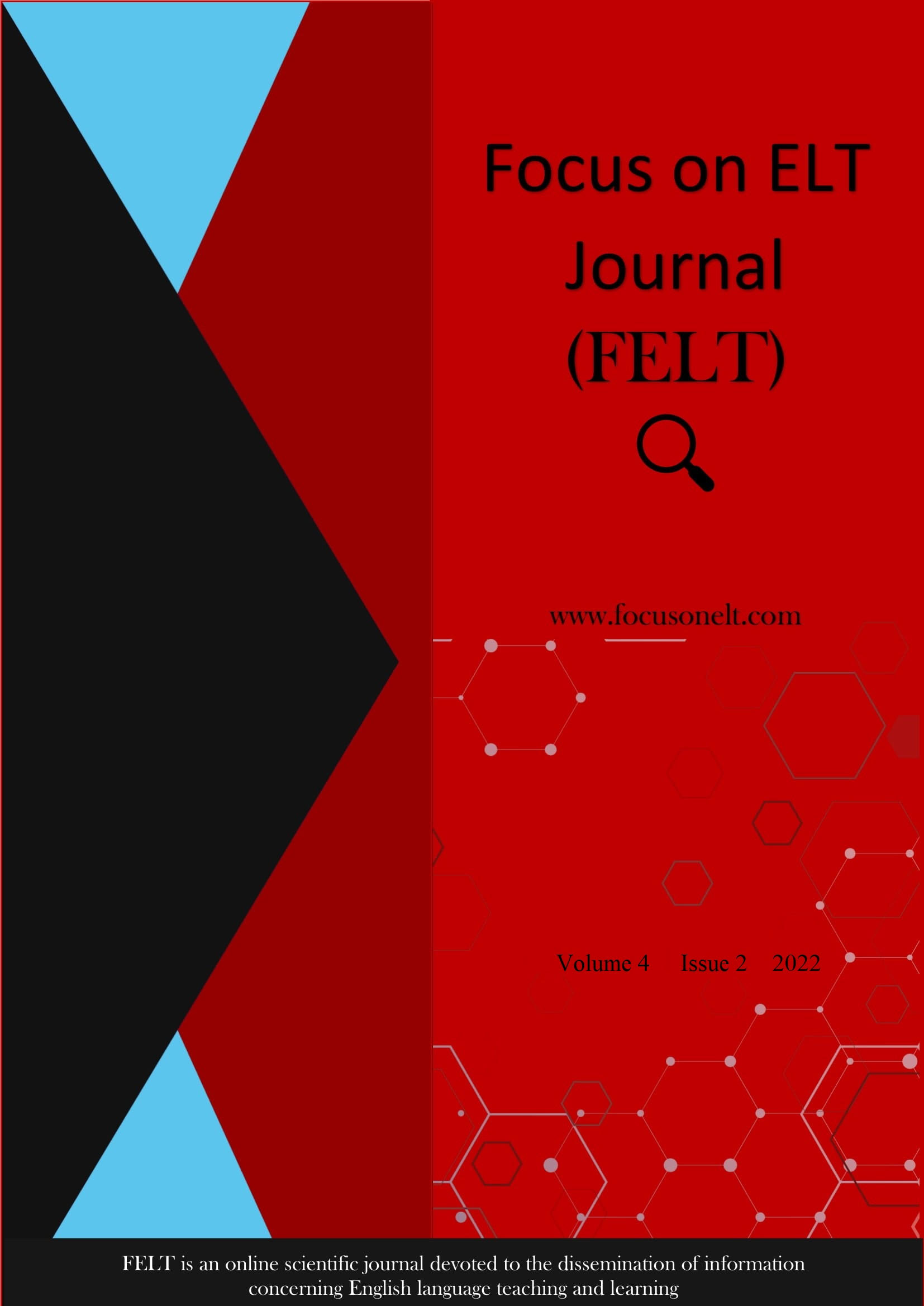Turkish instructors’ beliefs and EFL learners’ realization of speech act of requests: A descriptive case study
Main Article Content
Abstract
Although learners of English as a foreign language (EFL) receive language education according to the principles of the communicative approach, they lack pragmatics knowledge. As one of the main issues of pragmatics, speech act of requests has been investigated in the current study. More specifically, EFL instructors' beliefs about teaching requests have been examined as well as learners' realization of speech act of requests. The study was conducted with 20 students and six instructors at an English preparatory program of a state university in Türkiye. Students' data were collected through a Discourse Completion Task while instructors were interviewed. The results suggest that Turkish EFL learners commonly use conventionally direct strategies for making requests and their requests do not show pragma-linguistic diversity. Furthermore, the rank of imposition and social distance seems to be disregarded while making requests. Also based on the interviews with EFL instructors, it was found that they do not have adequate knowledge of teaching pragmatics, and thus, their classroom practices in speech acts of requests are limited. Therefore, this study implies the importance of teaching pragmatics to students at English preparatory programs and the need for enhancing instructors’ knowledge of teaching pragmatics.
Metrics
Article Details

This work is licensed under a Creative Commons Attribution-NonCommercial-NoDerivatives 4.0 International License.
References
Anderson, R. (2007). Thematic content analysis (TCA). Descriptive presentation of qualitative data, 1-4.
Austin, J. L. (1962). How to do things with words. Clarendon Press.
Bardovi-Harlig, K., & Mahan-Taylor, R. (2003). Teaching pragmatics. Washington, DC: Office of English Programs, U.S. Department of State. https://americanenglish.state.gov/files/ae/resource_files/03-41-3-h.pdf
Blum-Kulka, S., & Olshtain, E. (1984). Requests and apologies: A cross-cultural study of speech act realization patterns (CCSARP). Applied linguistics, 5(3), 196-213.
Brown, P., & Levinson, S. C. (1987). Politeness: Some universals in language use. Cambridge University Press.
Burgucu-Tazegül, A., Han, T., & Engin, A. O. (2016). Pragmatic failure of Turkish EFL learners in request emails to their professors. International Education Studies, 9(10), 105-115.
https://doi.org/10.5539/ies.v9n10p105
Canale, M., & Swain, M. (1980). Theoretical bases of communicative approaches to second language teaching and testing. Applied linguistics, 1(1), 1-47. https://doi.org/10.1093/applin/1.1.1
Chalak, A., & Abbasi, S. (2015). The effects of explicit and implicit pragmatic instruction on Iranian EFL learners’ production of suggestion speech act in the context of distance learning. Journal of Applied Linguistics and Language Research, 2(4), 275-284.
Danielewicz-Betz, A. (2013). (Mis) use of email in student-faculty interaction: Implications for university instruction in Germany, Saudi Arabia, and Japan. JALT CALL Journal, 9(1), 23-57.
https://doi.org/10.29140/jaltcall.v9n1.147
Deveci, T., & Hmida, I. B. (2017). The request speech act in emails by Arab university students in the UAE. Dil ve Dilbilimi Çalışmaları Dergisi, 13(1), 194-214.
Eslami-Rasekh, Z., Eslami-Rasekh, A., & Fatahi, A. (2004). The Effect of explicit metapragmatic instruction on the speech act awareness of advanced EFL Students. TESL-EJ, 8(2), 1-12.
Fukushima, S. (1996). Request strategies in British English and Japanese. Language Sciences, 18(3-4), 671-688.
https://doi.org/10.1016/S0388-0001(96)00041-1
Ghaedrahmat, M., Alavinia, P., & Biria, R. (2016). The effect of explicit vs. implicit instruction on mastering the speech act of thanking among Iranian male and female EFL learners. Latin American Journal of Content & Language Integrated Learning, 9(2), 401-424. https://doi.org/10.5294/laclil.2016.9.2.7
Güneş, Ç., & Ortaçtepe, D. (2019). Conceptual socialization in EFL contexts: A case study on Turkish EFL learners’ request speech acts realization. Dil ve Dilbilimi Çalışmaları Dergisi, 15(1), 376-399.
https://doi.org/10.17263/jlls.547766
Hymes, D. (1972). On communicative competence. In J.B. Pride & J. Holmes (Eds.), Sociolinguistics (pp. 269-293). Penguin.
Ishihara, N. (2011). Formal instruction on the speech act of giving and responding to compliments. The proceedings of the 7th conference of Pan-Pacific Association of Applied Linguistics, 62-78.
Kasper, G. (1997). Can pragmatic competence be taught? http://www. nflrc. hawaii. edu/NetWorks/NW06/.
Kılıçkaya, F. (2010). The pragmatic knowledge of Turkish EFL students in using certain request strategies. Gaziantep Üniversitesi Sosyal Bilimler Dergisi, 9(1), 185-201.
Leech, G. (1983). Principles of pragmatics. Longman.
Le Pair, R. (1996). Spanish request strategies: A cross-cultural analysis from an intercultural perspective. Language sciences, 18(3-4), 651-670. https://doi.org/10.1016/S0388-0001(96)00040-X
Mackey A. & Gass, M. S. (2005). Second language research, methodology and design. Lawrence Erlbaum.
Martînez-Flor, A. (2012). Examining EFL learners’ long-term instructional effects when mitigating. In M. Economidou-Kogetsidis and H. Woodfield (Eds.), Interlanguage Request Modification (pp. 243-274). John Benjamins Publishing Company. https://doi.org/10.1075/pbns.217.08mar
Masouleh, F. A., Arjmandi, M., & Vahdany, F. (2014). The effect of explicit metapragmatic instruction on request speech act awareness of intermediate EFL students at institute level. Universal Journal of Educational Research, 2(7), 504-511. https://doi.org/10.13189/ujer.2014.020702
Nugroho, A. (2019). Request realizations of Indonesian ESP lecturers. Celtic: A Journal of Culture, English Language Teaching, Literature and Linguistics, 6(1), 1-13. https://doi.org/10.22219/celtic.v6i1.8746
Nugroho, A., & Rekha, A. (2020). Speech acts of requests: A case of Indonesian EFL learners. Journal of English Language Teaching and Linguistics, 5(1), 1-16.
Ortaçtepe, D. (2012). The development of conceptual socialization in international students: A language socialization perspective on conceptual fluency and social identity. Cambridge Scholars Publishing.
Rose, K. R. (1997). Pragmatics in teacher education for nonnative‐speaking teachers: A consciousness‐raising approach. Language, Culture and Curriculum, 10(2), 125-138.
https://doi.org/10.1080/07908319709525246
Searle, J. R. (1975). A taxonomy of illocutionary acts. In Gunderson, k. (Ed.), Language, Mind and Knowledge (pp. 344-369). University of Minnesota.
Sykes, I. M. (2013). Learner apologies in Spanish. In N. Taguchi & J.M. Sykes (Eds.), Technology in interlanguage pragmatics research and teaching (pp. 71-98). John Benjamin Publishing Company.
https://doi.org/10.1075/lllt.36.05syk
Taguchi, N. (2011). Pragmatic development as a dynamic, complex process: General patterns and case histories. The Modern Language Journal, 95(4), 605-627. https://doi.org/10.1111/j.1540-4781.2011.01246.x
Taguchi, N., Naganuma, N., & Budding, C. (2015). Does instruction alter the naturalistic pattern of pragmatic development? A Case of request speech act. TESL-EJ, 19(3), 1-25.
Yin, R. K. (1984). Case Study Research: Design and Methods. Sage Publications.
Yule, G. (1996). Pragmatics. Oxford University Press.

